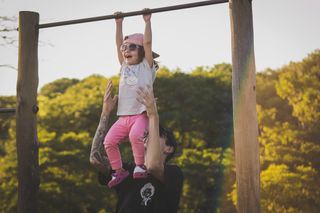Happiness
A Happiness Gap Between Fathers and Mothers
New research finds gender differences in parents' happiness.
Posted March 6, 2019

When I was pregnant with my first child, a friend of mine mentioned how much work his wife put into caring for their daughter. In listening to him describe the sleepless nights, the effort to breastfeed, and just generally how much time she spent, I said to him, “Well, that doesn’t seem fair.” Even though he is a doting father and dedicated partner, his response was, "Nothing about this is fair.”
Although our culture is moving to more egalitarian approaches to parenting — as seen by increasing numbers of stay-at-home dads and more moms as breadwinners — gender norms still dictate expectations regarding childrearing. Moms tend to bear more responsibility when it comes to raising children. Not only do they spend more time with their children, but they are also commonly the “managers” of their households, making sure everything runs smoothly. By contrast, dads often become the “fun parent,” spending more time with their children in play or leisure.
The motherhood happiness gap
Based on these gender norms that often drive differences in moms’ and dads’ experiences as parents, my colleagues and I wanted to understand whether moms and dads also experience differences in their happiness.
In a series of studies recently published online in Personality and Social Psychology Bulletin, we investigated gender differences in parents’ happiness. In our first two studies, we found that fathers reported greater happiness, fewer depressive symptoms, and more positive emotions than mothers and men without children, whereas mothers reported relatively more daily hassles.
In our third study, we considered how mothers and fathers feel while they are taking care of their children and interacting with them. For this study, participants downloaded an app on their smartphone and received a notification three times a day asking them what they were doing, if they were talking or interacting with anyone (and whom), and how they felt at that moment. (Try it here.) In this study, fathers reported greater happiness than mothers, both when they were taking care of their children and talking and interacting with them. Notably, mothers reported lower happiness when they were engaged in childcare than during other daily activities.
Together, these findings suggest a happiness gap for moms. Across studies, mothers consistently reported lower levels of happiness.
Why do fathers fare better than mothers?
The relative happiness of mothers and fathers may depend in part on how — and how much — they spend time with their kids. Fathers in our study were more likely to indicate that they were also engaged in play or leisure, both while they were providing care for their children and interacting with them. Play may offer fathers opportunities to experience positive emotions, such as love or joy, and to build closer relationships with their children. Of course, the reverse is also possible. Perhaps fathers engage in more play with their children, because they are already feeling happy.
Second, perhaps mothers’ greater responsibility for childrearing negatively influences their happiness. Studies find that moms spend more time with their children, and that they bear more responsibility for organizing, scheduling, and maintaining family activities. This invisible and emotional labor may contribute to greater stress and reduced happiness among mothers.
Third, the discrepancy between mothers’ and fathers’ happiness could also be exacerbated by the cultural expectations surrounding motherhood and fatherhood. A father who spends time with his children is viewed as an excellent parent, but mothers do not receive the same praise for their efforts. In other words, fathers tend to get “extra credit” for behavior that is expected of mothers.
Advice for parents
What should parents take away from these findings? One message might be that moms may feel happier if they spent more time playing with their children. “Great,” moms might think, “I’ll add that to my never-ending to-do list, and then that can give me something else to feel guilty about when I don’t have time to get to it.”
Instead of using these findings to send a message to moms, I think these findings should alert fathers and other family members. Moms have so much on their plates. What might you be able to do to lighten her load? In doing so, everyone in the family might benefit from moms' lower stress levels and greater happiness.
Facebook Image Credit: fizkes/Shutterstock
References
Nelson-Coffey, S. K., Killingsworth, M., Layous, K., Cole, S. W., & Lyubomirsky, S. (in press). Parenthood is associated with greater well-being for fathers than mothers. Personality and Social Psychology Bulletin. doi: 10.1177/0146167219829174




